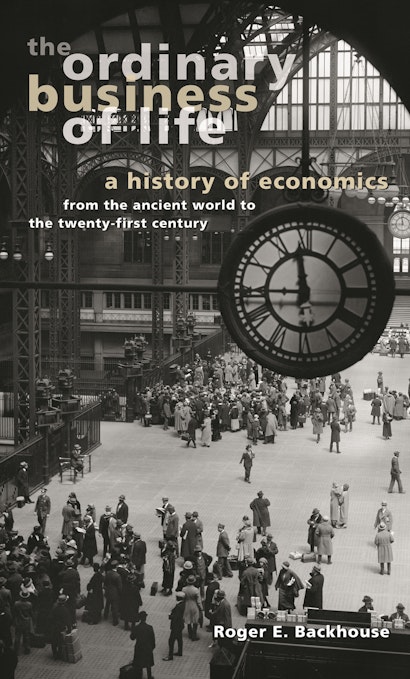In some of Western culture’s earliest writings, Hesiod defined the basic economic problem as one of scarce resources, a view still held by most economists. Diocletian tried to save the falling Roman Empire with wage and price fixes—a strategy that has not gone entirely out of style. And just as they did in the late nineteenth century, thinkers trained in physics renovated economic inquiry in the late twentieth century. Taking us from Homer to the frontiers of game theory, this book presents an engrossing history of economics, what Alfred Marshall called “the study of mankind in the ordinary business of life.”
While some regard economics as a modern invention, Roger Backhouse shows that economic ideas were influential even in antiquity—and that the origins of contemporary economic thought can be traced back to the ancients. He reveals the genesis of what we have come to think of as economic theory and shows the remarkable but seldom explored impact of economics, natural science, and philosophy on one another. Along the way, he introduces the fascinating characters who have thought about money and markets, including theologians, philosophers, politicians, lawyers, and poets as well as economists themselves. We learn how some of history’s most influential concepts arose from specific times and places: from the Stoic notion of natural law to the mercantilism that rose with the European nation-state; from postwar development economics to the recent experimental and statistical economics made possible by affluence and powerful computers.
Vividly written and unprecedented in its integration of ancient and modern economic history, this book is the best history of economics—and among the finest intellectual histories—to be published since Heilbroner’s The Worldly Philosophers. It proves that economics has been anything but “the dismal science.”
"An important work. . . . [Backhouse's] treatment gives deeper insight into historical economic writings and suggests broader views of contemporary economic issues than many well-read economists are likely to have. Interesting and accessible to amateurs, it should also be welcomed by professionals."—Publishers Weekly
"[Backhouse's] very readable history offers economists and interested readers an excellent account of the evolution of economic ideas."—Science
"Useful to those who already have a smattering of economic ideas but want to fill in the historical gaps . . . [this will] also be an eye-opener to specialist economists."—Samuel Brittan, Journal of Economic Literature
"This compact study gives an accomplished and remarkably comprehensive overview of an often arcane field of inquiry."—Kirkus Reviews
"Backhouse explains how world economics reached its present state. He places key figures in an appropriate historical context and then explains the various economic ideas as they emerged, using clear analysis and apt quotations. The result is a well-integrated, thoughtful, accessible text that makes a major contribution to the history and philosophy of economics. Important reading for students, professionals, and anyone interested in learning how economics has evolved."—Library Journal
"A scholarly book that will have appeal to well-read library patrons within the general population."—Mary Whaley, Booklist
"Thinking like a historian, [Backhouse] has tried . . . to explain how economics got to where it is, especially in its interconnections with other disciplines. He has largely succeeded."—The Economist
"A readable and enjoyable volume accessible to a broad audience, and of considerable value and interest to professional economists."—Choice
"Roger Backhouse has written a history of economics that is sweeping in its historical scope, while also being extremely concise. . . . [A] commendable introduction to the historical context of modern economics."—Stephen Kirchner, Policy
"Roger Backhouse's brief survey of the history of economic thought is well written and accessible to non-specialists. . . . [T]his is a fine book for a busy professional economist who wishes to delve into a short history of economic thought."—Robert E. Prasch, Journal of Economic Behavior and Organization
"Roger Backhouse's new history of economics is just what is needed: a short but still comprehensive history of economic thought which can be read with profit not only by economists but also by a variety of noneconomists, such as historians, philosophers, sociologists, and so on. Complex ideas are summarized with exemplary clarity, and the book practically reads itself. The Ordinary Business of Life is a find."—Richard Swedberg, Stockholm University, author of Max Weber and the Idea of Economic Sociology
"In recent years many new sub-fields of economics have undermined the grand 'neoclassical synthesis' of the mid-twentieth century. Readers of this concise yet sweeping survey will see clearly that today's major dissenting schools, like neoclassical economics itself, have deep roots in the discipline's rich classical heritage. Roger Backhouse has written an elegant and thoroughly enjoyable book that will enable a broad audience to appreciate both the continuities of economic thought and its unavoidable inner tensions."—Timur Kuran, Duke University
"Roger Backhouse provides what is perhaps the most readable history of the dismal science, describing the role of economic ideas in shaping the way we live and think from the ancient world to the present. Although it is obviously difficult to describe how economic models and theories evolved over several millennia, Mr. Backhouse has succeeded admirably. Few books can claim to provide such an accessible and complete cataloging of the role that economic ideas have played in the 'ordinary business of life.' "—George Borjas, Harvard University, and author of Heaven's Door: Immigration Policy and the American Economy
"Backhouse is perhaps the best person in the world to write this historian's history of economic thought. His is the history of the visions, not the technical tools, of the great economic traditions and schools. His deep knowledge of economic theory shows on every page."—Herbert Gintis, University of Massachusetts, author of Game Theory Evolving

